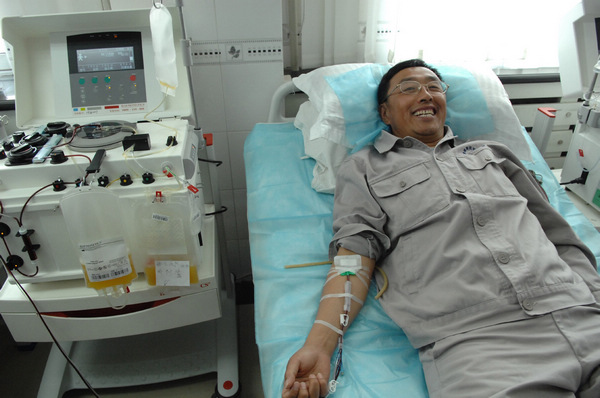Legal aid
In the face of criticism, the Changsha authority said its policy may have been misinterpreted by the media. However, it said that material rewards are just as vital as the happiness someone gets from the knowledge they did something good.
 |
|
Guo Mingyi, a 53-year-old steel worker in Liaoning province, was honored by the Communist Party of China as a "modern-day Lei Feng" on Friday, three days ahead of the annual Learn from Lei Feng Day. The honor was given to Guo for helping others by donating more than 60,000 milliliters of blood. Su Zhongchuang / China News Service |
"For those who make significant contributions, especially those severely injured or killed helping others, why shouldn't we help them or their family?" said Yang Changjiang, deputy publicity director for the city's Party committee.
Officials are also attempting to address what many argue is the root cause of people's reluctance to intervene in incidents: The fear of being blamed and sued.
After the death of Yue Yue, Shenzhen released a draft regulation that, if approved, will protect the interests of good Samaritans, making them exempt from responsibility when things go wrong, as long as there is no evidence of negligence or deliberate sabotage.
If an accusation is made, claimants must produce solid proof against the good Samaritan, while false claims can result in prosecution, the draft states.
This would prevent cases such as the one in June that saw Xu Yunhe ordered to pay more than 100,000 yuan ($15,800) to an elderly woman he helped after she fell down 5 meters away from his car in Tianjin. Despite a lack of evidence, the judge said the plaintiff's fall was "definitely influenced by the car somehow".
Shenzhen's draft regulation has won support from the majority of the public, the authority said.
In Western nations such as the United States and Canada, laws protecting good Samaritans who intervene in incidents resulting in injury or death have been in place since the late 1950s.
In a research paper on the legislative issues in salvage operations, Zhou Chengxin writes: "The US is the typical example of the common law system, which is mostly made up by case law. However, the Good Samaritan Law is written law, which shows how important it is to the country."
The director of the research institute under Shenzhen's legislative affairs office goes on to add that China has no similar laws or regulations, which results in difficult cases in which "rescuers shed tears after shedding blood".
Although the draft regulation has now completed the consultation stage, Zhou told China Daily on Thursday that it is still unclear what step will be taken next.
Huang Yuli in Shenzhen and Yang Wanli in Beijing contributed to this story.
